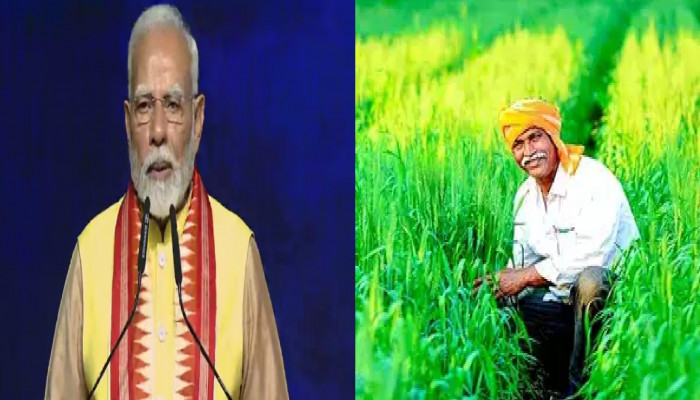First cabinet meeting of 2025 announces special packages for farmers
- In Reports
- 02:48 PM, Jan 02, 2025
- Myind Staff
Prime Minister Narendra Modi praised the government's decision to continue the Pradhan Mantri Fasal Bima Yojana and the restructured weather-based Crop Insurance Scheme. He also welcomed the extension of the one-time special package for di-ammonium phosphate, which will now be available beyond the NBS subsidy from January 1 to December 31, 2025.
"Ours is a Government fully committed to furthering the welfare of farmers. We are proud of all our farmer sisters and brothers who work hard to feed our nation. The first Cabinet of 2025 is dedicated to enhancing prosperity for our farmers. I am glad that key decisions have been taken in this regard," PM Modi said in a post on X. "The Cabinet decision on extending the One-time Special Package on Di-Ammonium Phosphate will help our farmers by ensuring DAP at affordable prices," he added. The Union Cabinet approved the continuation of the One-time Special Package for Di-Ammonium Phosphate (DAP) from January 1 this year until further notice. This decision aims to ensure that farmers can access DAP at affordable prices, even beyond the National Basic Subsidy (NBS).
The estimated budget requirement is around Rs 3,850 crore. The Union Cabinet has approved the extension of the Pradhan Mantri Fasal Bima Yojana and the Restructured Weather-Based Crop Insurance Scheme until 2025-26, with a total funding of Rs 69,515.71 crore from 2021-22 to 2025-26. This decision will help provide crop risk coverage for farmers across the country against natural disasters that cannot be prevented, until 2025-26. Additionally, to introduce more technology into the scheme for better transparency, accurate claim calculations and faster settlements, the Cabinet has approved the creation of a new Fund for Innovation and Technology (FIAT) with a corpus of Rs 824.77 crore.
The financing will be used to support research and development projects as well as technology initiatives under the program, such as WINDS and YES-TECH. The Yield Estimation System using Technology (YES-TECH) uses Remote Sensing Technology to estimate crop yields, with at least 30% of the estimate based on technology-driven methods. Currently, nine major states (Andhra Pradesh, Assam, Haryana, Uttar Pradesh, Madhya Pradesh, Maharashtra, Odisha, Tamil Nadu and Karnataka) are implementing this system, and other states are being added quickly. As YES-TECH is more widely adopted, Crop Cutting Experiments and similar practices will gradually be phased out. For the 2023-24 period, claim calculations and settlements have been completed. Madhya Pradesh has fully adopted technology-based yield estimation, using it 100%.
The Weather Information and Network Data Systems (WINDS) aims to set up Automatic Weather Stations (AWS) at the block level and Automatic Rain Gauges (ARGs) at the panchayat level. The goal is to increase the current network density by five times to provide more localised weather data. Under this initiative, the Central and State Governments will only pay for the data rental costs. Nine major states—Kerala, Uttar Pradesh, Himachal Pradesh, Puducherry, Assam, Odisha, Karnataka, Uttarakhand, and Rajasthan—are already working on implementing WINDS, and other states have also shown interest in joining.
The Weather Information and Network Data Systems (WINDS) aims to set up Automatic Weather Stations (AWS) at the block level and Automatic Rain Gauges (ARGs) at the panchayat level. The goal is to increase the current network density by five times to provide more localised weather data. Under this initiative, the Central and State Governments will only pay for the data rental costs. Nine major states—Kerala, Uttar Pradesh, Himachal Pradesh, Puducherry, Assam, Odisha, Karnataka, Uttarakhand and Rajasthan—are already working on implementing WINDS, and other states have also shown interest in joining. According to the EFC, states were unable to implement WINDS during 2023–2024 (the first year) due to the various background preparation and planning tasks needed prior to tendering. In order to provide state governments with greater central money share in a 90:10 ratio, the Union Cabinet has, therefore, approved 2024–2025 as the first year of WINDS implementation as opposed to 2023–2024 earlier.
The government has stated that all efforts are being made and will continue to be made to reach all farmers in the northeastern states as a priority. However, since participation in the scheme is voluntary and the gross cropped area is smaller in these states, some flexibility has been allowed. This means that if funds are not fully used, they can be reallocated to other development projects and schemes that require funding. Union Agriculture Minister Shivraj Singh Chouhan praised the measures made by the union cabinet and stated that the central government's top objective is the advancement of agriculture and the well-being of farmers. Uttarakhand Chief Minister Pushkar Singh Dhami praised the federal cabinet's actions, saying they will give farmers financial protection in the event of agricultural losses brought on by natural disasters. Fertilisers would be made continuously available and affordable, which will boost agricultural output, he said.







Comments